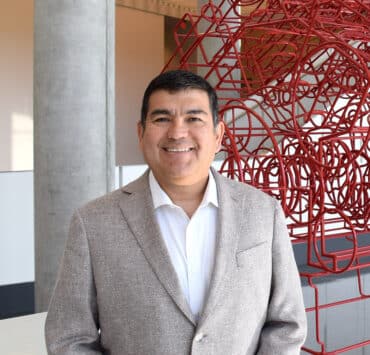|
Getting your Trinity Audio player ready...
|
Not since the electrification of the late 19th and early 20th centuries has the world been in such a state of energy transition. Global warming is a pressing issue, and John Barquin, vice president of transactional legal support at Charlotte, North Carolina-headquartered Duke Energy, will tell you that the challenges and opportunities are immense.
“I’m confident that we will get it right,” the attorney says, “even if it may be bumpy at times. That’s just the nature of the challenge.”
Barquin, who has been in-house at Duke Energy since 2009, has witnessed the world embark on the massive transition to cleaner energy sources. After managing the company’s international legal department, he moved into a domestic role as VP of transactional legal support. Today, he and his team provide enterprise legal support for a broad array of functions that are key to executing the clean energy transition. As such, he’s very aware of how much externalities, such as the political and societal climate, can affect Duke Energy’s pivot to sustainable and reliable energy solutions.
“So many of these conversations have contradictory inputs,” the VP explains. “For example, trade policy targeting Chinese-sourced solar panels and components is making deployment of solar energy more challenging, since so much of the world’s silicon comes from China. Utility-scale battery storage is similarly affected.”
Permitting is another challenge. “Getting gas and power transmission lines permitted can be an immensely difficult process. And even after the permitting review process is completed, there’s always the risk of legal actions aimed at delaying projects. You wind up running up against people who want you to move to more sustainable energy sources but can’t agree on how you’re going to get there.”
Another distinct challenge is the increased demand for power. “Consider the increased demand for power required to run AI applications, data centers, and electric vehicles. This calls for a huge increase in generation and transmission capacity at the same time we’re phasing out fossil fuel generation and rolling out new technologies. It’s akin to walking a tightrope while juggling.”
All these challenges, the lawyer explains, are causing him and his Duke Energy colleagues to employ creative new approaches to supply chain, construction, fuels, and similar pieces central to the clean energy transition puzzle.
“I’m confident that we will get [the energy transition] right, even if it may be bumpy at times.”
John Barquin
Moreover, at current technology and cost levels, some greener energy sources, such as solar, pose issues of reliability and affordability. “Without cost-effective battery storage, excessive reliance on generation can lead to reliability issues: What do you do when you have a week of cloudy, cold weather in the dead of winter? Solar’s diminished output can be mitigated by building a lot of redundancy, but that leads to unreasonable electric bills for consumers. And you still need some way to provide power at 2 a.m. in the middle of January.”
Given the current state of battery storage technology, Barquin thinks the energy transition is going to require natural gas as a bridge to allow the retirement of coal plants (which are the biggest emitters of greenhouse gases). This bridge would also assure reliability and affordability in the first stages of the green transition. While deploying solar and other greener resources, Duke Energy is working to increase its natural gas generation to do just that. It may not be a permanent solution, but the savings in emissions alone is worth the change.
Thanks to its large-scale deployment of solar, nuclear, and gas generation, Duke Energy’s carbon emissions from electric generation have decreased 48 percent since 2005. The company is on the way to reducing carbon emissions by at least 50 percent by 2030 and is committed to a net zero goal by 2050.
Barquin says technological, political, and regulatory challenges will always exist, and it’s possible the energy sector will feel bumps along the way. But it’s a ride Barquin enjoys after a decade and a half on the job.
“[Increased demand for power] calls for a huge increase in generation and transmission capacity at the same time we’re phasing out fossil fuel generation and rolling out new technologies. It’s akin to walking a tightrope while juggling.”
John Barquin
In fact, Barquin remembers his wife commenting on his demeanor just a few months after he went in-house at Duke Energy.
“I had been outside counsel to Duke Energy on a number of occasions, and while my wife thought I was nuts for going in-house, she knew I loved the culture and the way people truly collaborate here,” Barquin remembers. “After about six months, I remember her telling me that she didn’t want me to ever go back to private practice. She said I was a different person and that I seemed so happy in what I was doing.”
Barquin says his bilingual, bicultural background has been an asset throughout his career. “You grow up with the ability to grasp different perspectives, because that’s been part of your foundational experience. You understand that you can say the same thing in one language as opposed to another, albeit by different means. And you get quite good at ‘translating’ behaviors and attitudes,” the lawyer says. But he’ll never forget that, after emigrating from Cuba to the United States as a child, he found an unlikely but effective English teacher.
“My best English teacher was probably Bugs Bunny and Hanna-Barbera cartoons,” the attorney says. “At a young age, you absorb the language like a sponge, and as I look back, that was a very accessible way to learn English.”
In fact, Barquin got so good at English that he had to relearn his alveolar trill, the “rolled r” in Spanish, as Bugs Bunny and co. nearly made him forget.
And for those younger readers, Barquin stresses that they don’t necessarily need to know their path. The future VP graduated from college with “a BA in History and Middle Eastern Studies, astounding grades, and no job prospects.”
That is to say that not every lawyer dreams of becoming a lawyer from a young age, and sometimes one finds their career through different means. It’s OK, it’s valid, and it obviously didn’t hinder Barquin’s success. Find your way at your own speed and keep an open mind.
McGuireWoods’ energy industry experience has been recognized for the depth of our bench – more than 200 interdisciplinary lawyers and governmental affairs professionals – and the extent of our experience. Our work for energy companies, utilities in particular, has been a long-standing priority and a signature practice of McGuireWoods. We represent about 25% of the nation’s utilities, and many of our clients have been with the firm for a decade or longer. As a result, our legal advice is informed by a commercial mind-set that is specific to the industry. To learn more, visit www.mcguirewoods.com.

